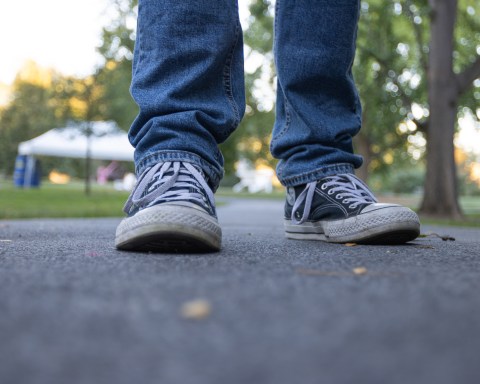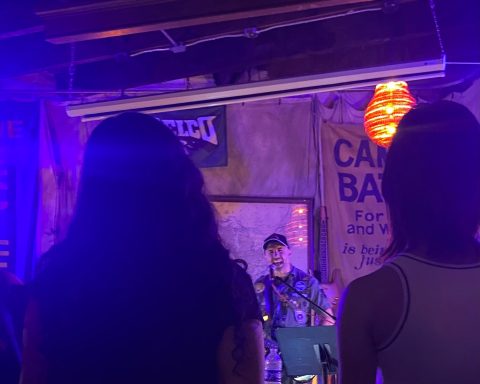Editor’s note: This article was initially published in The Daily Gazette, Swarthmore’s online, daily newspaper founded in Fall 1996. As of Fall 2018, the DG has merged with The Phoenix. See the about page to read more about the DG.
Princeton University professor and anthropologist Serguei Oushakine visited campus last Thursday, presenting a lecture entitled “Remember, Repeat, Reenact: Managing Russian History Affectively” that used a variety of media to provoke thought on complex issues of memory, trauma, and collectivity. An associate professor of Slavic Languages and Anthropology and director of the Program in Russian and Eurasian Studies at Princeton, Oushakine focused on the emotional aspects of remembering, the “affective” over the “effective.”
He discussed several examples of historical reenactments in modern-day Russia, as well as the reappropriation of historical objects and songs, that serve to connect past, present, and future in a narrative-like process he refers to as “chronological suturing.” This elaborate, theatrical reimagining of the past helps to craft collective memory and synchronize emotions amongst, especially, Russia’s dislocated youth, estranged from the war whose glorified shadows they gaze at in parades and television specials and whose antiquated melodies they download as their ringtones, in case the ghosts of their grandparents ever call.
Oushakine began his talk by describing and showing video footage from one particularly significant reenactment – a 2011 military parade in Moscow’s Red Square, organized to echo a parade that took place in 1941, at the onset of The Great Patriotic War (Великая Отечественная война), the segment of World War II in which the Soviet Union was involved.
On a giant screen, footage played from the 1941 march, when all of a sudden, the lines of uniformed soldiers began to spill out into the Square in real time as actors wearing authentic costumes emerged from under the screen. As the screen raised itself higher, the stream of soldiers spread, forming a seemingly seamless link between then and now.
In Oushakine’s 2013 article in Ab Imperio, “Remembering in Public,” on which his Thursday lecture was based, he describes this event as the “mimetic transposition of the past into the present.”
The question remains, though, of how this act of mimesis, Aristotle’s word for imitation, shapes what it is seeking to capture, granting it meaning and emotional vibrancy for its receptive audience. The act of suturing is never a natural one – like a wrinkle in time, something must be disrupted to wrench one era into another.
This sense of wrongness is never more apparent than in one clip Oushakine showed, from an annual televised concert series called “Songs of Victory” (“Песни Победы”), in which current-day Russian pop musicians cover old war songs with a jarring energy and sexuality. And yet, the camera zooms in on the audience, swaying and crying to a thoroughly modern spectacle that attempts to recall a trauma many of them have not experienced. (As Oushakine put it, “It could’ve been just Napoleon, they’re not attached to it at all”).
In Russian, the word “переживать” has a lot of meanings. It means to live through or survive, but also to re-live emotions or experiences – perception and memory become one. Through this process, of making history palpable, relevant, and felt, Oushakine argues that consumers of these remodeled historical products are brought together – over what? Absence, loss, and trauma, reimagined. But the process of catharsis, Oushakine explained in an interview with The Daily Gazette, renegotiates conflict by way of feeling.
“What happens at the moment of catharsis is a certain reconciliation with things that you can’t change,” Oushakine said. “You realize that and that has an influence on you, but […] anguish and anxiety can stop […] only for a short period.” Oushakine gave the example of a series of segments taped by the Russian television channel NTV, in which people were brought to the newly discovered burial sites of their ancestors, considered missing in action since the war. They experience moments of overwhelming emotion, much like the ecstatic concert-goers. One man, sitting on a boat on an open stretch of ocean above where his father’s body lay, was struck almost speechless by the experience.
“The relative is still missing, you don’t have an access to the grave, but there is this fleeting moment of harmony,” Oushakine said. “That’s what gives you hope – does it change your situation? No, it doesn’t […] It does not remove the causes of the anguish or anxiety, but makes it palatable.”
Oushakine has written about communities of loss, communities “that are defined and unified and brought together by this experience of absence,” as he explains it. “One way to deal with your trauma is to repress it, and that’s what a lot of people do because you don’t want to talk about it, it’s painful […] but some people can turn it into something like, into something generative and productive for creating social networks […] or creating some rituals of remembrance,” he said.
These rituals are clearly useful, providing some degree of comfort and clarity, but can their inherent emotionality be manipulative? As the speechless man on the boat demonstrates, sometimes the heady rush of catharsis can prevent reflection or analysis. Is true history being lost to the flash and dazzle of reconstructed memory?
“Catharsis as an idea comes mostly from […] the world of theater, which is manipulation through and through, where it’s completely staged, so the point is to provoke a very particular emotional response,” Oushakine explained. “What is does, it prevents you from analyzing the historical material because you are so much caught up in this emotional condition that you are going through. It can be very powerful, as we saw,” he said.
Oushakine described this effect as one of paralysis, and in his talk he mentioned the idea of a “catharsis that keeps them in line,” an effect achieved perhaps by discouraging true thought about traumatic historical events. After all, remembering will always be an imperfect process of selection, framing, and forgetting – what we remember is far from the truth. Is modern-day Russia trading in true historical understanding for an emotional understanding, and if so, is this trade worth it?
Oushakine offered no answers, preferring to delve the “how” of managing memory than whether these methods are ideal. He does, however, see historical conflict, like war, as an opportunity for people to start telling stories, to attempt to suture a wound, to weave meaning, somehow, across loss.
As Oushakine puts it, “If you read Dostoevsky, he [says] again and again and again that suffering is something that makes you different. It’s an opportunity to reconsider your identity, your relationship to the world, and the way you’re dealing with your past and also with your future.” Managing memory, especially traumatic memory, can therefore be a productive process of creation, inspiring sense-making and creating a new narrative for a still-recovering nation.















Author is using drugs?